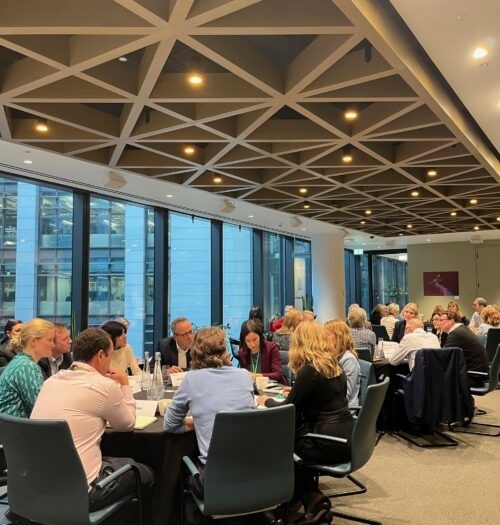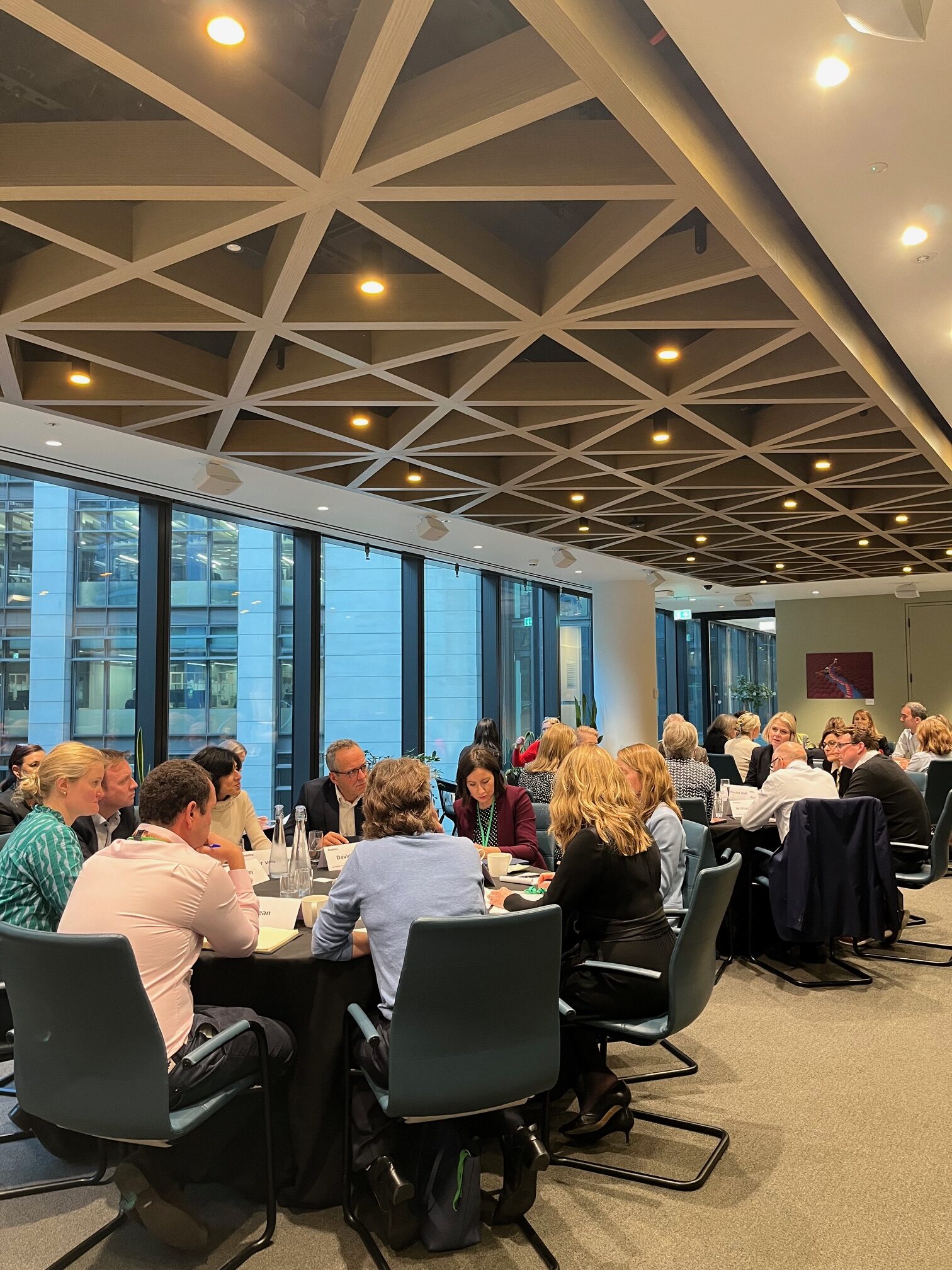
Embedding sustainability into core business
After the hottest year on record and with the evidence of the adverse impacts of climate change all around us, businesses need to redouble their efforts to cut emissions, build resilience amid a rapidly warming world and ensure that the impacts of climate change and the energy transition do not fall disproportionately on the most vulnerable.
But there is good news. We are living in a country that is innovative, creative and known for its ability to solve problems, and action on sustainability can lead to a range of business benefits. It is up to CSOs, NEDs and chairs to lead the transition, indeed it is fundamental to the role of a NED to look at the long-term resilience of a business, its delivery to shareholders and its impact on society.
So, are you discussing it in the boardroom?
More work lies ahead, as this is a generational challenge that cannot be solved by just a few leading companies. Instead, it is up to all businesses to accelerate their efforts and drive the kind of rapid change needed for a sustainable future. Yet most boards today have no sustainability formally embedded within them.
How can we create a net positive mindset around sustainability efforts in the boardroom and make sure it is a core part of the business?
Chapter Zero and Deloitte hosted a roundtable discussion with a group of non-executive and executive directors to explore the barriers to sustainability and ways to overcome them.
What are executives saying?
Deloitte's 2024 CxO Sustainability Report surveyed over 2,100 executives across 27 countries on their views and strategies related to sustainability and climate change. It revealed:
- Climate change is a top three priority
- 92% of executives believe their company can grow while reducing greenhouse gas emissions
- 85% of business leaders have increased sustainability investments in the past year
- 45% are transforming their business model and strategy to address climate change
- 50% are implementing technology solutions for environmental goals, and 42%
plan to do so within two years
“This is a critical time. We are leaders. We have capacity. But we need to move, we need to take big action, and we need to be very solid about it.”
Participant
Roundtable topic 1: What are the barriers to integrating climate sustainability into core business?
The issues participants struggle with:
- Return on investment: The lack of immediate return on investment, despite
long-term value and risk mitigation, poses a challenge in obtaining board approval. - Short-term focus: Boards and CEOs typically prioritise short-term goals, making it challenging to focus on sustainability initiatives with longer time frames (e.g., ten years or more).
- Investor understanding: Investors may not fully understand or support ESG efforts and are often hesitant hesitant due to perceived higher costs associated with sustainability.
- Underestimating risks: Climate risks tend to be underestimated, and the cost of inaction often goes uncaptured.
- Knowledge gap: There’s a lack of sustainability and climate knowledge
and skills among executive and non-executives. - Limited Chief Sustainability Officer (CSO) authority: CSOs often lack the authority to drive significant change, particularly if they don’t report to top executives.
- Shareholder engagement: Limited shareholder engagement hinders progress.
- Competing priorities: Social issues can overshadow environmental goals on
board agendas. - Data and definition challenges: A lack of reliable, accessible data and common, consistent definitions hinders businesses from turning insights into action.
- Reporting burden: Reporting requirements drain resources that could be directed at implementing sustainability actions.
“In non-exec recruitment, very rarely do you get asked about your sustainability experience compared to, for example, your experience in digital transformation.”
Participant
Roundtable topic 2: How do you move past those barriers?
Participants suggest:
- Demonstrate and scale: Develop a robust business case that showcases the commercial viability of sustainability initiatives. Develop clear, actionable plans with tangible impact and measurable results to scale.
- Data-driven communication: Use fact based, data-driven stories to articulate the positive impact of sustainability initiatives.
- Competitive advantage: Position sustainability as a key driver of competitive advantage rather than a means of compliance, unlocking its full potential for business growth.
- Double materiality approach: Adopt a double materiality approach, looking at both financial (‘outside in’) and impact (‘inside out’) materiality to assess risks and opportunities.
- Elevate CSO role: CSO to report directly to the CEO, fostering greater accountability and strategic alignment.
- Strategic talent acquisition: Prioritise the recruitment of individuals with sustainability expertise.
- Continuous learning: Invest in ongoing education and training programmes to enhance sustainability knowledge and business skills, empowering employees to drive ESG initiatives effectively.
- Progress over perfection: Embrace a ‘progress over perfection’ mindset, emphasising continuous improvement rather than flawless solutions.
- Regular sustainability discussion: Add sustainability as a standing item on meeting agendas, fostering ongoing dialogue.
- Sustainability ambassadors: Appoint sustainability ambassadors at all levels in the organisation to embed sustainability as a core value and champion efforts.
- Prioritise B2B: Consider prioritising B2B engagement over B2C. Business consumers often demonstrate a higher willingness to pay for sustainable products and services.
“How can you decipher all of the signals and the white noise to really see what customers are willing to do?”
Participant
Roundtable topic 3: What are your best tips for bringing climate sustainability into the boardroom?
Participants recommend:
- Finance is the language of the boardroom: Align sustainability goals with financial performance to demonstrate tangible value and integrate sustainability targets into the remuneration structure to incentivise progress.
- Value-driven approach: Frame sustainability as a core value driver and a source of competitive advantage, rather than solely a compliance requirement. This shift in perspective encourages greater buy-in and proactive engagement.
- Strategic agenda setting: Integrate sustainability as a standing item on board meeting agendas. Provide targeted training to board members to enhance their understanding of sustainability and encourage active engagement in related discussions.
- External insights and perspectives: Invite external speakers from diverse industries to meetings. This provides board members with valuable cross-industry insights and stimulates broader, more informed discussions around sustainability.
- Consistent communication: Increase the consistency, quality and impact of sustainability discussions by regularly highlighting ongoing efforts and achievements.
- Alignment: Ensure board alignment on overarching sustainability goals.
- Blended committees: Form blended committees comprising of NEDs and C-suite
leaders. Ensure each member has a clearly defined role within the ESG agenda, fostering shared ownership
“I work with a company that starts every meeting, whether it is an executive meeting, board meeting or committee meeting, with a sustainability item. It is an enforcing device, usually followed by a five to ten-minute discussion. That is a good way of bringing it to life on a regular basis.”
Participant
Key takeaways
- Demonstrating ROI: When presenting sustainability initiatives, it’s crucial to address the board’s focus on return on investment (ROI). Clearly communicate how these efforts generate value and contribute to long-term financial sustainability. Break down long-term climate commitments into short, medium and long-term targets and actions to monitor progress.
- Upskill C-suite & board: Provide your C-suite and board with the knowledge and skills to understand future sustainability implications. Invite internal and external experts to share their insights and consider appointing a sustainability expert to the board.
- Increased sustainability cadence: Sustainability must be a core, recurring topic on board meeting agendas, fostering regular, high-quality discussions

Read More
This article is based on a roundtable session held in partnership with Deloitte. You can access the full summary through the link below.
Read the summary


